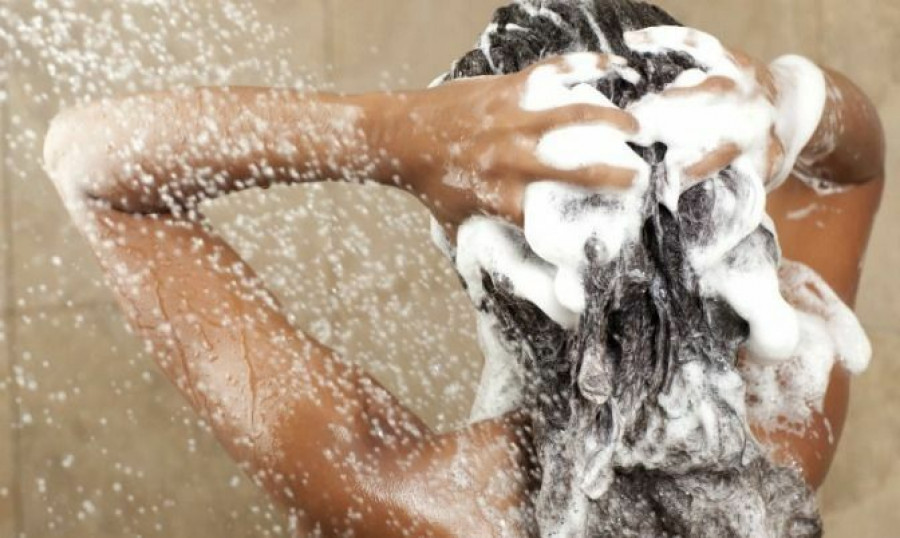After I embraced my natural texture I like most people, perused the blogs and watched Youtube videos not so much for how to care for my hair, but more for styling options. I was surprised at the overabundance of information available and the attention given to the actual cleansing and conditioning process. To me it was kind of obvious – you cleanse your hair and then you condition right? Well, hang on; it turns out this wasn’t so obvious and has become a hotly debated topic within the natural community with hair care practices that seemed to go against the norm. One such practice is conditioner washing or co-washing which has a cult-like following. People were swearing by it and how it made such a difference in the health and management of their hair. My inquiring mind wanted to know more about what it was all about, and if there was any merit to its claims.
The “No-Poo” Method
Lorraine Massey who revolutionized caring for curly hair popularized the “no shampoo” method. She wrote the book “Curly Girl” which details how to properly care for curly and coily hair types. When she was a stylist living in Hong Kong at 19, one day she didn’t wash her hair with shampoo and realized how great her hair looked:
“I’d skip a shampoo and then notice that it looked better,” she says. “And then I’d wait longer and longer and my hair would look even better and then I’d think, Oh my God! What am I doing? This is gross! And I’d use shampoo again and my hair would freak out and look terrible. Eventually, I realized that my hair looked best without shampoo and the harshness of Sodium Laurel Sulfate found in all shampoos. The curls would lie nicely on top of each other. They had a shine. The cuticle was moist. The outside world around me noticed and everyone would say, ‘I love your hair’.
For those of you who are not aware, the no-poo method, prompted by Lorraine Massey and now popularized by Chaz Dean with his Wen haircare line is essentially eliminating or reducing the use of shampoo on the hair and “cleansing” it with conditioner. Any type of conditioner is good for the hair and it doesn’t need to be expensive in order for it to “cleanse” the hair. However the question I had when I first heard about co-washing is this: when you are co-washing your hair are you cleansing it or conditioning it? What is the true purpose of conditioner washing (ask co-washing)?
How Shampoos Work
In order to work, Shampoos contain surfactants. Chemically, surfactants are polar molecules meaning they have a water-soluble end, and an oil-soluble end. In other words one end is attracted to water and the other to oil. This structure gives surfactants the unique ability to combine oil and water and it also allows them to create foam as well. When the shampoo is applied to the hair the surfactants surround the dirt and debris and lift it off your hair and keep it suspended in the rinse water so it goes down the drain, not back on your hair.
Is there something legitimate to Conditioner Washing?
Lorraine Massey found harsh surfactants like sodium lauryl sulfate to be the primary concern with her using shampoos. Cosmetic science has come a long way in the development of surfactants that don’t strip the hair. Additionally, with the demand for less harsh shampoos companies are formulating products that offer extra conditioning with the cleansing benefits of detergents.
Does co-washing work? Well there are thousands of curlies who have used it and swear by it for improving the integrity of their hair. While there have been no scientific studies on the validity of this method, anecdotal reports are enough to make people consider adding it to their hair care regime. It’s a beneficial method for individuals with dry, textured hair; however for someone with oily hair it may not do such a good job or removing sebum and buildup.
The decision to conditioner wash is entirely personal. I can count on one hand how many times I’ve done it, not because I’m against the practice, but because the shampoo I use from Earthtones Naturals doesn’t contain harsh detergents but tons of conditioning ingredients that make my hair feel extremely soft after it’s washed. I also use oils and butters on my hair that require more than conditioner to be removed.
If co-washing there are a couple of things to consider:
1. Any conditioner will do. You don’t need to use expensive “cleansing conditioners” to achieve the desired results. While these products typically contain other ingredients to pimp the product such as botanicals, if they are water-soluble ingredients and don’t penetrate into the hair shaft in any appreciable amount then they, like your money, can be washed down the drain.
The primary conditioning ingredient in these products is the cationic quaternary compounds such as behentrimonium methosulfate, cetrimonium bromide or similar ingredient. I’ll also mention that some of these specially formulated cleansing conditioners contain low concentrations of surfactants such as cocamidopropyl betaine. This is a synthetic surfactant derived from coconut oil and dimethylaminopropylamine. I don’t suggest breaking your budget on your co-washing conditioner. Find an inexpensive one that does the job. Where you’ll want to invest (perhaps) is in your moisturizing product because it’s actually left in the hair and not rinsed out
2. If you use a lot of oils on your hair such as heavy pomades, butters or sealing moisturizers, co-washing all of the time may not be enough to remove these oils, sebum and product build-up from the hair. You’ll need to shampoo at least once a month in order to remove the product residues. I’ve seen women discuss on various blogs that certain products aren’t “working” anymore. This is likely less to do with the product and more to do with the build up of product on the hair which can leave the hair with a coated feeling.
Additionally, other products can lose their effectiveness when the buildup affects the cuticles. Shampoos won’t lather properly and conditioners don’t work effectively to soften and detangle the hair. Washing the hair monthly with a sulfate-based shampoo (yes, a sulfate based shampoo!) can effectively remove product build-up and give you a clean slate to work with. Of course you would always follow this up with a conditioner and moisturizer. Bi-weekly cleansing with moisturizing shampoos that don’t contain harsh surfactants can also be effective at gently removing product build-up and residue without stripping the hair.
So the question is, do you co-wash? If so, how often and how does YOUR hair feel compared to using sulfate-free shampoos?







